A comprehensive list of law school programs and tuition in Canada

For more up to date information see Canadian law schools 2022/23: Resources if you're considering whether, and where, to become a lawyer.
To assist aspiring lawyers in choosing the right school, Canadian Lawyer has listed all 24 law schools in Canada and has provided their tuition information, notable faculty members, joint degree programs and the licensure requirements in their provinces.
LIST OF CANADIAN LAW SCHOOLS, IN ALPHABETICAL ORDER:
University of Alberta – Faculty of Law
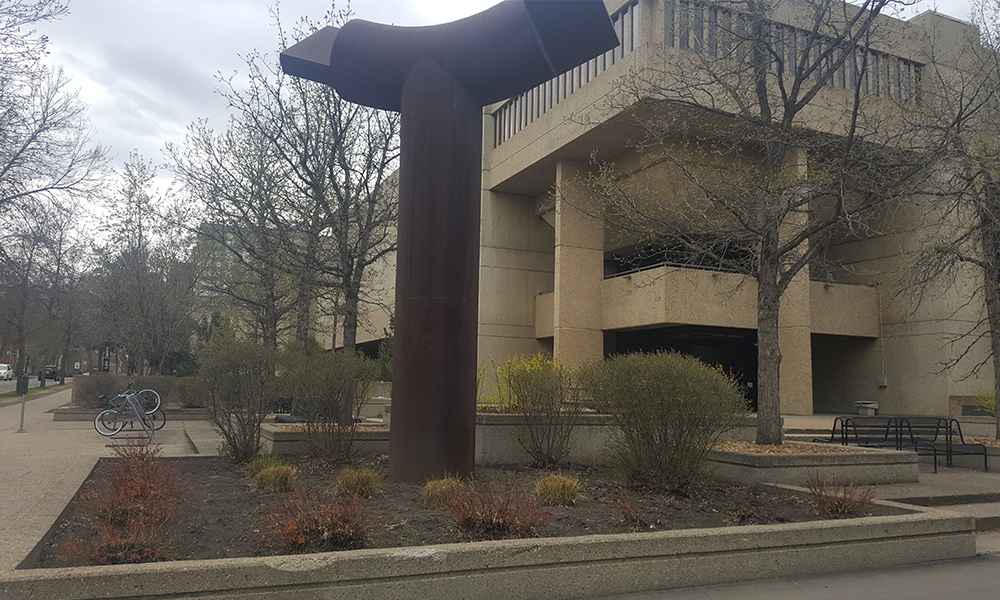
LOCATION:
Edmonton, Alberta (licensure requirements)
LAW DEGREES AND ADMISSION REQUIREMENTS:
- Juris Doctor (JD)
- Master of Laws (LLM)
- Doctor of Philosophy in Law (PhD)
- Internationally Trained Lawyer Pathway
TUITION RATES:
- Juris Doctor (JD): The 2021-2022 estimated costs for the first year are $15,203.90, comprising $11,701.48 for tuition, $1,600.00 for books and supplies and $1,902.42 for noninstructional fees.
- Master of Laws (LLM)
- Doctor of Philosophy in Law (PhD)
- Internationally Trained Lawyer Pathway: $30,000
NOTABLE FACULTY MEMBERS:
OTHER INFORMATION:
University of British Columbia – Peter A. Allard School of Law

LOCATION:
Vancouver, British Columbia (licensure requirements)
LAW DEGREES AND ADMISSION REQUIREMENTS:
- Juris Doctor (JD)
- Master of Laws (LLM)
- Master of Laws (Common Law) (LLM CL)
- Master of Laws in Taxation (LLM in Taxation)
- Doctor of Philosophy in Law (PhD)
TUITION RATES:
The 2021-2022 tuition for domestic JD students is $13,149.44 for first year and $12,327.60 each for the second and third years. For international JD students, it is $38,854.40 for first year and $36,426.00 each for the second and third years. Information found here.
NOTABLE FACULTY MEMBERS:
OTHER INFORMATION:
Allard Law offers a wide range of experiential learning opportunities, such as legal clinics that provide students with hands-on learning experience with real clients, moots and exchange opportunities. The law school’s program has a strong focus on Indigenous legal studies. In terms of financial assistance, the law school offers approximately $1,000,000 in bursaries each year, as well as numerous scholarships and awards.
University of Calgary – Faculty of Law
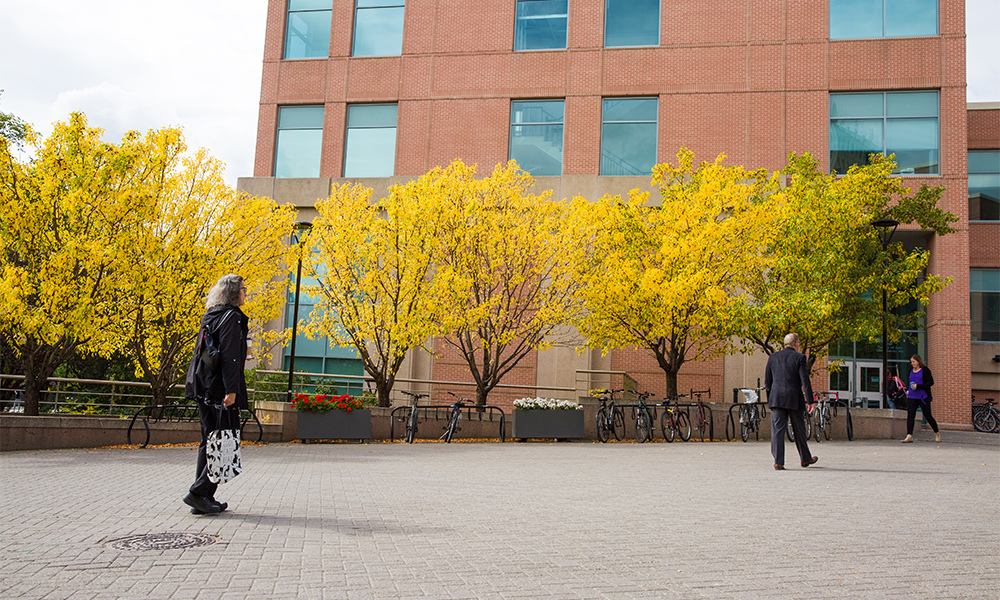
LOCATION:
Calgary, Alberta (licensure requirements)
LAW DEGREES AND ADMISSION REQUIREMENTS:
- Juris Doctor (JD)
- Juris Doctor and Master of Business Administration (JD/MBA)
- Juris Doctor and Master of Public Policy (JD/MPP)
- Master of Laws (LLM) – Thesis-based
- Master of Laws (LLM) – Course-based
- Doctor of Philosophy in Law (PhD)
- Master of Science (MSc) in Sustainable Energy Development
- Graduate Certificate in Natural Resources, Energy & Environmental Law
- Certification in Common Law in French in partnership with the University of Ottawa
- International Energy Lawyers Program, a joint JD/JD with the University of Houston
- Foreign-Trained Lawyers Program
TUITION RATES:
The 2021-2022 tuition and fees for the JD program are approximately $15,400 per year for Canadian students. Information found here. Tuition for the new Foreign-Trained Lawyers Program is $30,000.
NOTABLE FACULTY MEMBERS:
OTHER INFORMATION:
In 2020, UCalgary Law launched its new Black Students Admissions Process, which is intended to address the under-representation of Black students within the law school and within the larger legal community, as well as to lessen the systemic barriers leading to the under-representation of Black law students and, consequently, Black lawyers. The articling placement rate for the Class of 2020 was 98 per cent. Information about the demographic makeup of the class of 2023 may be found here.
Dalhousie University – Schulich School of Law
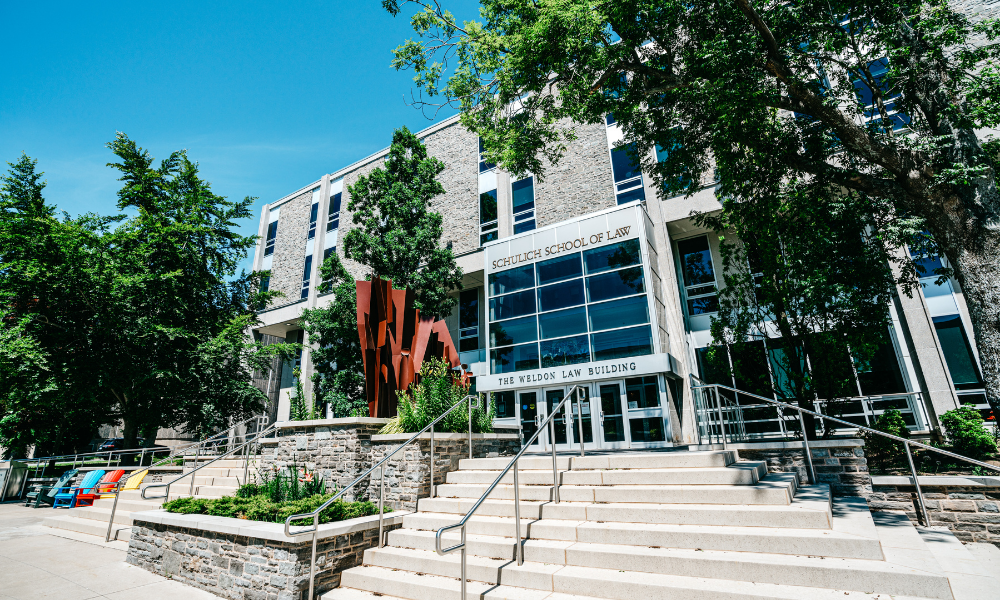
LOCATION:
Halifax, Nova Scotia (licensure requirements)
LAW DEGREES AND ADMISSION REQUIREMENTS:
- Juris Doctor (JD)
- Juris Doctor and Master of Business Administration (JD/MBA)
- Juris Doctor and Master of Health Administration (JD/MHA)
- Juris Doctor and Master of Information (JD/MI)
- Juris Doctor and Master of Public Administration (JD/MPA)
- Master of Laws (LLM)
- Doctor of Philosophy in Law (PhD)
- Master of Electronic Commerce (MEC)
TUITION RATES:
Tuition and fees for full-time law students in 2021-2022 are $20,998.50. Students who are not Canadian citizens or permanent residents are also required to pay an additional international tuition fee. Information found here.
NOTABLE FACULTY MEMBERS:
OTHER INFORMATION:
In 2020-2021, the law school introduced a JD Certificate in Aboriginal and Indigenous Law, as well as a Certificate in Criminal Justice. This was also the first year that the initio Technology and Innovation Law Clinic was fully operational, acting as a resource for technology start-ups seeking early-stage legal services, while training students to act and to advise in innovation and start-up matters. The year of 2020 also marked a milestone for Dalhousie Legal Aid Service, the oldest clinical legal education program in Canada, as it celebrated 50 years of community impact.
Lakehead University – Faculty of Law (Bora Laskin Faculty of Law)
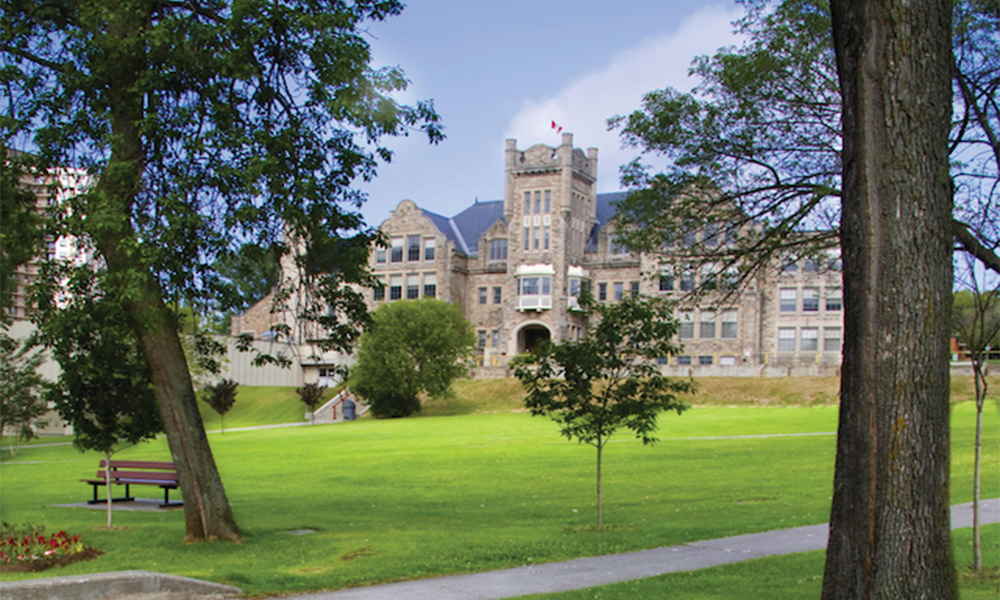
LOCATION:
Thunder Bay, Ontario (licensure requirements)
LAW DEGREE AND ADMISSION REQUIREMENTS:
Juris Doctor (JD)
TUITION RATES:
Year 1:
- Tuition — $16,734.43
- Ancillary fees — $1,199.37
- Total — $17,933.80
Year 2:
- Tuition — $15,796.28
- Ancillary fees — $1,179.37
- Total — $16,975.65
Year 3:
- Tuition — $15,796.28
- Ancillary fees — $1,179.37
- Total — $16,975.65
These rates are for 2021-2022. Information found here.
NOTABLE FACULTY MEMBERS:
OTHER INFORMATION:
The law school centres its program on three mandates, chosen due to the school’s Northern location: first, Aboriginal and Indigenous law; second, natural resources and environmental law; and third, sole or small firm practice, with an integrated practice curriculum. The law school had implemented mandatory courses in Aboriginal and Indigenous laws even before the Calls to Action by the Truth and Reconciliation Commission of Canada. The law school’s Integrated Practice Curriculum is the first in the country to include legal professional training in the curriculum, which consequently qualifies graduates to take the bar examinations without needing to article with a firm. Through the school’s student legal clinic, Lakehead University Community Legal Services, students gain hands-on experience by offering free legal services to low-income residents of Northwestern Ontario.
Université Laval – Baccalauréat en Droit
LOCATION:
Quebec City, Quebec (licensure requirements)
LAW DEGREES AND ADMISSION REQUIREMENTS:
- Certificate of Law
- Bachelor of Laws (LLB)
- Doctor of Laws (LLD)
- Master of Laws (LLM) in Business Law
- Master of Laws (LLM) in Environmental Law, Sustainable Development and Food Security
- Master of Laws (LLM) in Fundamental Rights
- Master of Laws (LLM) in International and Transnational Law
- Master of Laws (LLM) in Notarial Law
TUITION RATES:
For Quebec students taking a master’s degree, the tuition for one full-time semester consisting of 12 credits is $1,554.12, while the cost of one academic year is $15,400. For Canadian students not residing in Quebec, the tuition for one full-time semester consisting of 12 credits is $3,866.28, while the cost of one academic year is $20,025. These rates are for 2021-2022. Information found here.
NOTABLE FACULTY MEMBERS:
OTHER INFORMATION:
Considering itself a francophone leader in North America, the school accepts about 400 students per year, coming from all continents. With an emphasis on social justice and sustainable development, the law school focuses on not just the theoretical side of law, but also gives its students hands-on learning experiences such as legal clinic courses, moot courts and externships. The school also offers four dual degrees, during which students spend a semester in one of four French partner universities: Université Paris 1 Panthéon-Sorbonne, to focus on environmental law, sustainable development and food safety; Université de Bordeaux, to focus on the law of transatlantic relationships; Université Paris-Saclay, to focus on intellectual property law and digital technologies; and Université Toulouse Capitole, to focus on penal law and criminal sciences.
University of Manitoba – Robson Hall Faculty of Law
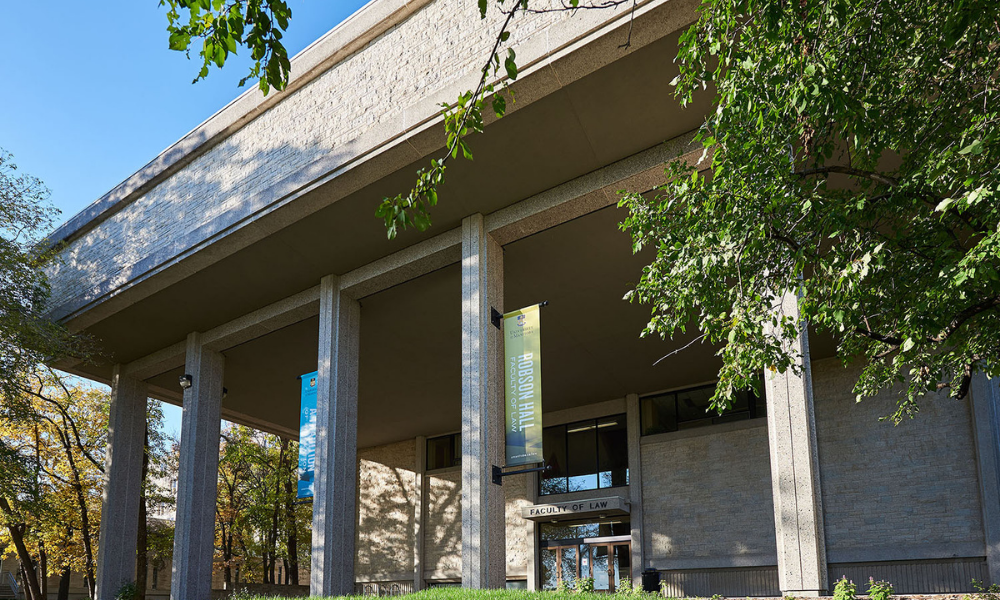
LOCATION:
Winnipeg, Manitoba (licensure requirements)
ADMISSION REQUIREMENTS:
Information found here.
LAW DEGREES:
TUITION RATES:
The approximate 2021-2022 tuition is $12,400 for Canadians and permanent residents and $28,900 for international students. Information found here.
NOTABLE FACULTY MEMBERS:
McGill University – Faculty of Law
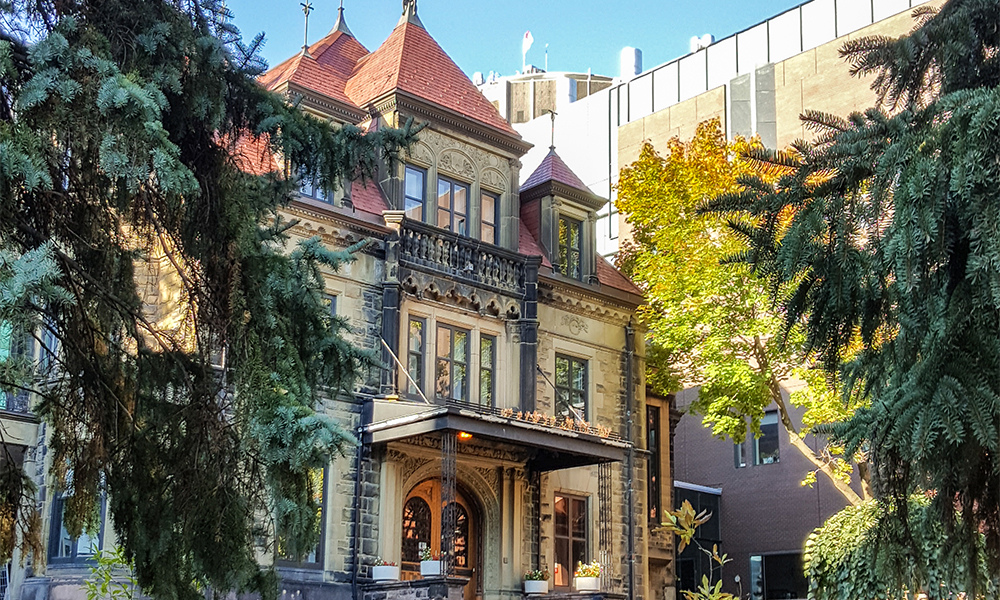
Image credit: Lysanne Larose.
LOCATION:
Montreal, Quebec (licensure requirements)
LAW DEGREES AND ADMISSION REQUIREMENTS:
- Juris Doctor and Bachelor of Civil Law (BCL/JD)
- BCL/JD and Master of Business Administration (MBA)
- BCL/JD and Master of Social Work (MSW)
- Master of Laws (LLM) in General Law – Thesis or Non-Thesis
- Master of Laws (LLM) in Air and Space Law – Thesis or Non-Thesis
- Master of Laws (LLM) in Environment – Thesis or Non-Thesis
- Master of Laws (LLM) in Bioethics – Thesis-based
- Doctor of Civil Law – Law
- Doctor of Civil Law – Comparative Law
- Doctor of Civil Law – Air and Space Law
TUITION RATES:
BCL/JD program:
- Quebec residents: $5,060.61/year
- Canadian residents, outside of Quebec: $10,841.01/year
- International students: $52,359.21/year
- Quebec residents: $1,362.50/term
- Canadian residents, outside of Quebec: $1,362.50/term
- International students: $8,375.25/term
- Quebec residents: $1,362.60/term
- Canadian residents outside of Quebec: $4,252.80/term
- International students: $9,330.90/term
- Quebec residents: $1,362.60/term
- Canadian residents, outside of Quebec: $4,252.80/term
- International students: $12,862.50/term
These rates are for 2021-2022.
NOTABLE FACULTY MEMBERS:
OTHER INFORMATION:
Graduates of the law school’s bilingual BCL/JD program will obtain both a Bachelor of Civil Law degree and a Juris Doctor, opening the door to legal careers in all Canadian provinces, the U.S. and beyond. A full list of the law school’s courses may be found here, while details of the law school’s class and alumni profiles for 2020 may be found here. The law school holds activities such as its Integration Week, which prepares first-year students through introductory lectures and small group workshops, as well as its elective Focus Week workshops, in which upper-year students learn about practical skills such as negotiation, mediation, electronic discovery and evidence gathering. Furthermore, in addition to various law courses that incorporate Indigenous legal traditions into the curricula, the law school established a compulsory first-year Indigenous legal traditions course in the fall of 2020. The McGill Centre for Human Rights and Legal Pluralism offers learning opportunities like international human rights internships and international judicial clerkships.
Université de Moncton – Faculté de Droit
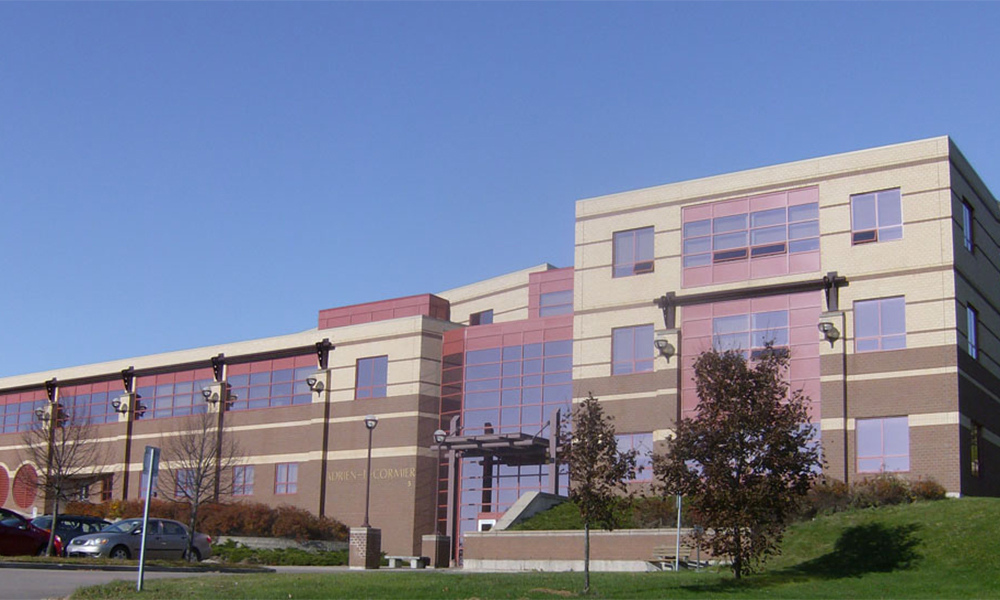
LOCATION:
Moncton, New Brunswick (licensure requirements)
ADMISSION REQUIREMENTS:
Information found here.
LAW DEGREES:
- Juris Doctor (JD)
- Master of Laws (LLM)
- Juris Doctor and Master of Business Administration (JD-MBA)
- Juris Doctor and Master of Public Administration (JD-MAP)
- Juris Doctor and Master of Environmental Studies (JD-MEE)
- Diplôme d'études en common law (DECL)
TUITION RATES:
For a graduate three-credit course, the tuition fee is $807, while the tutorial fee is $1,346. More information here.
NOTABLE FACULTY MEMBERS:
OTHER INFORMATION:
The law school offers training in common law solely in French. Upon graduation, students will be equipped with the necessary skills to exercise their legal profession in both French and English.
The law school is relatively small, with around 130 students from Canada, Africa and Europe. The students all know each other because they are often required to collaborate in small groups. The students will have the opportunity to be involved in the law school’s research activities, both during their time in school and during their professional lives.
Université de Montréal – Faculté de Droit
LOCATION:
Montreal, Quebec (licensure requirements)
LAW DEGREES AND ADMISSION REQUIREMENTS:
- Juris Doctor (JD) in North American Common Law
- Bachelor of Laws (LLB)
- Master of Laws (LLM)
- Master of Laws (LLM) in Comparative Common Law
- Master of Laws (LLM) in Comparative Private Law
- Master of Laws (LLM) in Notarial Law
- Business Law in a Global Context (LLM)
- Master of Electronic Commerce (MEC)
- Doctor of Philosophy in Law (PhD)
TUITION RATES:
Information on tuition and fees found here. To find out what fees specifically apply, one may check out the cost calculator here.
NOTABLE FACULTY MEMBERS:
University of New Brunswick – Faculty of Law
LOCATION:
Fredericton, New Brunswick (licensure requirements)
LAW DEGREES AND ADMISSION REQUIREMENTS:
TUITION RATES:
The degree program tuition, which is applicable to law students beginning a new program of study in Fall 2021, is $13,522, plus mandatory and student organization fees of $948.50, plus supplemental fees. More information here.
NOTABLE FACULTY MEMBERS:
University of Ottawa – Common Law
LOCATION:
Ottawa, Ontario (licensure requirements)
ADMISSION REQUIREMENTS:
Information found here.
LAW DEGREES:
- Juris Doctor (JD) in English
- Juris Doctor (JD) in French
- Juris Doctor (JD) – National Program
- Master of Laws (LLM)
- Doctor of Philosophy in Law (PhD)
- Juris Doctor and Master of Arts (International Affairs) (JD-MA)
- Juris Doctor and Master of Business Administration (JD-MBA)
- Juris Doctor and Honours Bachelor of Social Sciences with Specialization in Political Science (JD-BSocSc)
- Juris Doctor and Bachelor of Commerce (Commercial Sciences) (JD-BCom)
- Programme de droit canadien (JD and LLL)
- Canadian-American Dual Juris Doctor (JD) Program
- Certificate of Common Law in French
TUITION RATES:
Tuition fees are calculated based on how far one has progressed in the program. Information found here.
NOTABLE FACULTY MEMBERS:
OTHER INFORMATION:
The common law program in French admits around 80 new students per year. Taking the LSAT is not a requirement for acceptance. The law school offers numerous opportunities for active learning, including legal clinics, law mentorship programs, legal writing programs, moot courts, internships, a law practice program and a pro bono national student network program.
University of Ottawa – Droit civil
LOCATION:
Ottawa, Ontario (licensure requirements)
ADMISSION REQUIREMENTS:
Information found here.
LAW DEGREES:
- Licence en droit (LLL)
- Licence en droit civil et B.sc.soc. spécialisé en développement international et mondialisation (LLL/DVM)
- Licence en droit civil et Maîtrise en administration des affaires (LLL/MBA)
- Certificat général en droit
- Maîtrise générale en droit (LLM)
- Doctorat en droit (PhD)
- Programme National (JD/LLL)
TUITION RATES:
Information found here.
NOTABLE FACULTY MEMBERS:
Université du Québec à Montréal – Faculté de science politique et de droit
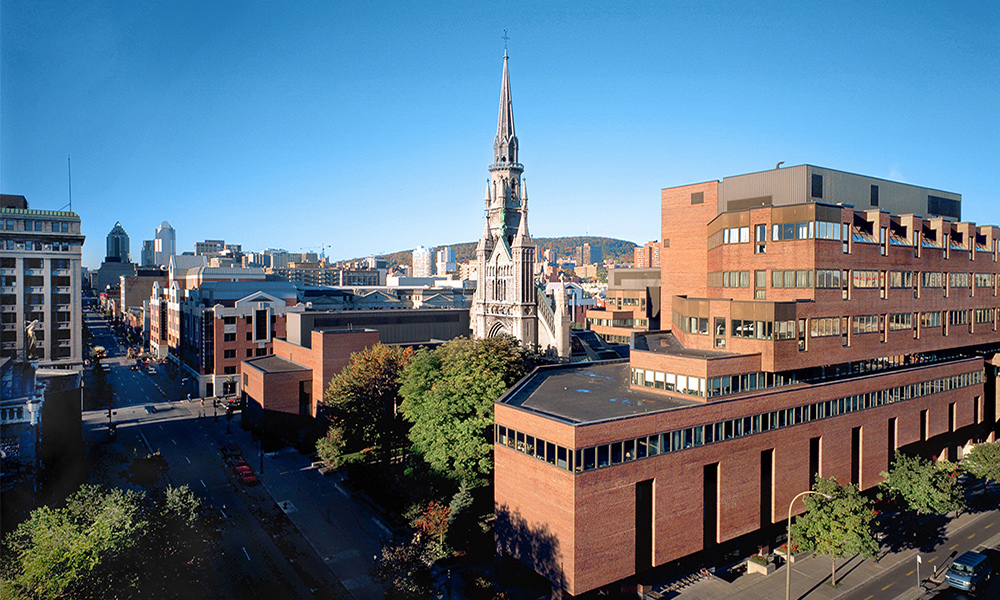
LOCATION:
Montreal, Quebec (licensure requirements)
LAW DEGREES AND ADMISSION REQUIREMENTS:
Undergraduate program
- Certificate in Social and Labour Law
- Bachelor in International Relations and International Law
- Bachelor of Laws (LLB) – Since September 2020, students can apply for one of the following concentrations: women’s studies, Indigenous studies, ethnic studies and international communications.
Graduate program
Short programs
- Labour and Social Protection Law
- Human Rights
Specialized graduate diplomas (DESS)
- Labour and Social Protection Law
- Human Rights
Master’s program (LLM)
- Master of Laws, thesis option – Since September 2020, students can apply for one of the following concentrations: labour law, international law and law and society.
- Master of Laws, non-thesis option – concentration in international law and international politics
Doctoral program
Doctorate of Law (PhD)
TUITION RATES:
Undergraduate program (5 courses):
- Quebecer or permanent resident of Quebec: $1,721.88/semester
- Canadian or permanent resident (non-resident of Quebec): $4,612.08/semester
Master’s program (4 courses):
- Quebecer or permanent resident: $1,340.73/semester for the thesis option; $1,416.96/semester for the non-thesis option
- Canadian or permanent resident (non-resident of Quebec): $3,508.38/semester for the thesis option; $3,729.12/semester for the non-thesis option
Doctoral program:
- Quebecer or permanent resident: $1,340.73/semester
- Canadian or permanent resident (non-resident of Quebec): $1,340.73/semester
All these 2021-2022 rates do not include the insurance fees, which are approximately $900/year or $300/semester. Information found here.
NOTABLE FACULTY MEMBERS:
OTHER INFORMATION:
The school’s Bachelor of Laws program was revamped in 2019, with an emphasis on producing lawyers committed to social justice. The school is selective in its admissions process, with an average annual admission rate of 26 per cent. In spite of the law school’s relatively small size, its students have participated in many prestigious international simulations and moot court competitions, garnering many awards and distinctions in these events. The law school offers a range of legal clinics: the UQAM Legal Clinic, the International Human Rights Clinic, UQAM Pro Bono, Innocence Quebec Project and the Mobile Legal Clinic. Notable alumni of the law school include Lucie Fournier, Quebec Court of Appeal judge; Ann-Marie Jones, chairperson of the Human Rights Tribunal; and Guy Cournoyer, Superior Court of Quebec judge.
Queen’s University – Faculty of Law
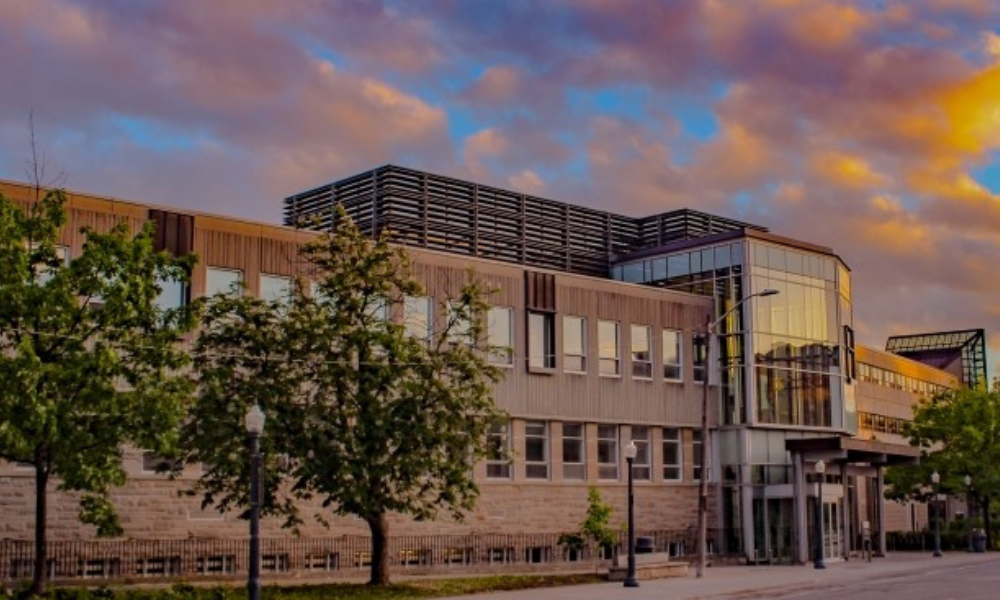
LOCATION:
Kingston, Ontario (licensure requirements)
LAW DEGREES AND ADMISSION REQUIREMENTS:
- Juris Doctor (JD)
- Bachelor of Commerce and Juris Doctor (BCom/JD)
- Juris Doctor and Master of Business Administration (JD/MBA)
- Master of Economics and Juris Doctor (MA(Econ)/JD)
- Master of Public Administration and Juris Doctor (MPA/JD)
- Master of Industrial Relations and Juris Doctor (MIR/JD)
- Civil Law and Common Law Combined Program
- Master of Laws (LLM)
- Doctor of Philosophy in Law (PhD)
- Graduate Program in Political and Legal Thought
- Certificate in Law (Online)
- Graduate Diploma in Immigration and Citizenship Law (GDip) (Online)
TUITION RATES:
- Juris Doctor (JD): $18,287.66
- Master of Laws (LLM): $7,108.34
- Doctor of Philosophy in Law (PhD)
- Certificate in Law: $1,134.00/course for external students
- Graduate Diploma in Immigration and Citizenship Law (GDip): $14,167.00
These rates are for 2021-2022.
NOTABLE FACULTY MEMBERS:
View the full list of faculty members.
OTHER INFORMATION:
Queen’s Law aims to be a Canadian leader in legal education through its diversified curriculum offerings, innovative online programs, experiential learning opportunities with a focus on community justice, career development services, commitment to EDII, and international research prominence. The law school offers two international law programs, in which students are sent to the Bader International Study Centre in Herstmonceux Castle in England for an eight-week course that features international law class studies, as well as field studies to important legal bodies.
In January 2021, the law school launched the Graduate Diploma in Immigration and Citizenship Law, Canada’s only English-language pathway to certification as an immigration consultant that is designed for individuals who are looking to enter Canada’s immigration sector, as well as those seeking to enhance their skills and competencies around immigration. The law school also offers experiential learning and access to community justice through its legal clinics, including the only prison law clinic and one of only two elder law clinics in the country.
In terms of its admissions process, the law school’s Access Category prioritizes applicants with diverse backgrounds, qualities and experiences. Information about the school’s class profile for its latest first year cohort may be found here. A range of financial assistance services, as well as funds and bursaries are also available. The law school prides itself in achieving around 96 per cent placement rates per graduating class, as of the September following graduation.
Ryerson University – Lincoln Alexander School of Law

Image credit: Alyssa K. Faoro.
LOCATION:
Toronto, Ontario (licensure requirements)
LAW DEGREES AND ADMISSION REQUIREMENTS:
Juris Doctor (JD)
TUITION RATES:
- Canadian citizens and permanent residents: tuition fees of $21,168, plus ancillary and related fees of $885.81, for a total of $22,053.81.
- International students: tuition fees of $31,168.00, plus ancillary and related fees (including mandatory University Health Insurance Plan fees) of $1,605.81, for a total of $32,773.81.
These rates are for 2021-2022. Information found here.
NOTABLE FACULTY MEMBERS:
OTHER INFORMATION:
The law school seeks to reimagine legal education in pursuit of a more just society and to create a vibrant and diverse academic environment that is focused on developing a new kind of lawyer: one who is innovative, adaptable and well-equipped to meet evolving social challenges and shifts taking place in the Canadian legal market. Foundational pillars include improving access to justice; stimulating innovation and entrepreneurship; offering sound academic grounding with innovative pedagogy; and promoting equity, diversity and inclusion.
As part of its Integrated Practice Curriculum, law students will participate in a series of intensive courses that focus on the business of lawyering, on building emotional and cultural competencies and on coding and contemporary technological practices. The law school aims to equip the lawyers of tomorrow with the contemporary skills and experience required to tackle novel challenges in an increasingly innovation-based economy.
Law students will develop an entrepreneurial mindset required to succeed in a wide range of professional environments and to serve a broad range of communities, including those who have often been underserved by the legal community.
University of Saskatchewan – College of Law

LOCATION:
Saskatoon, Saskatchewan (licensure requirements)
LAW DEGREES AND ADMISSION REQUIREMENTS:
Certificates and combined degree programs
- Certification in common law in French (CCLF) in partnership with the University of Ottawa
- Bachelor of Commerce and Juris Doctor (BComm/JD)
- Bachelor of Business Administration and Juris Doctor (BBA/JD)
- Juris Doctor and Masters of Business Administration (JD/MBA)
- Bachelor of Arts and Juris Doctor or Bachelor of Science and Juris Doctor (BA/JD or BSc/JD)
- Bachelor of Arts (four-year) and Juris Doctor
TUITION RATES:
- Juris Doctor (JD): tuition is $15,651
- Master of Laws (LLM): tuition/term is $1,491.00
These rates are for 2021-2022. The international differential is 1.81 times the domestic rate. Information found here.
NOTABLE FACULTY MEMBERS:
OTHER INFORMATION:
The law school has committed to annually reserving two seats in the JD program for Indigenous students from Newfoundland and Labrador. The law school offers a number of unique financial aid opportunities, including a scholarship for applicants self-declaring as LGBT persons, funded by alumni and married couple Brad Berg and Brian Rolfes. The law school also has the Nicole L. Thornbury Memorial Bursary, for students graduating from a Newfoundland high school, and the J. Barrie Thomson Scholarship, for students interested in the field of agriculture.
Special programs provided by the law school include the Kwayeskastasowin Setting Things Right course, the Nunavut Law Program and the Dean’s Forum on Dispute Resolution and Access to Justice. The Dean’s Forum gives students the chance to interact with stakeholders in the justice system to discuss access to justice issues. The law school’s Ariel F. Sallows Chair in Human Rights is the first endowed chair of human rights in any law school across Canada.
Université de Sherbrooke – Faculté de droit
LOCATION:
Sherbrooke, Quebec (licensure requirements)
LAW DEGREES AND ADMISSION REQUIREMENTS:
First Cycle - Bachelor of Laws
- Baccalauréat en droit – cheminement général
- Baccalauréat en droit – cheminement coopératif
- Baccalauréat en droit avec diplôme en common law et droit transnational (Juris Doctor)
- Droit et sciences de la vie
- Droit-MBA régime coopératif
Second Cycle - Course Type
- Droit et politiques de la santé
- Prévention et règlement des différends
- Maîtrise en droit notarial
- Common law et droit transnational
- Droit international et politique internationale appliqués
- Maîtrise en pratique du droit criminel et pénal
- Microprogramme en médiation environnementale
- Maîtrise en environnement
- Maîtrise en médiation interculturelle
Second Cycle - Research Type
TUITION RATES:
Information found here.
NOTABLE FACULTY MEMBERS:
Thompson Rivers University – Faculty of Law
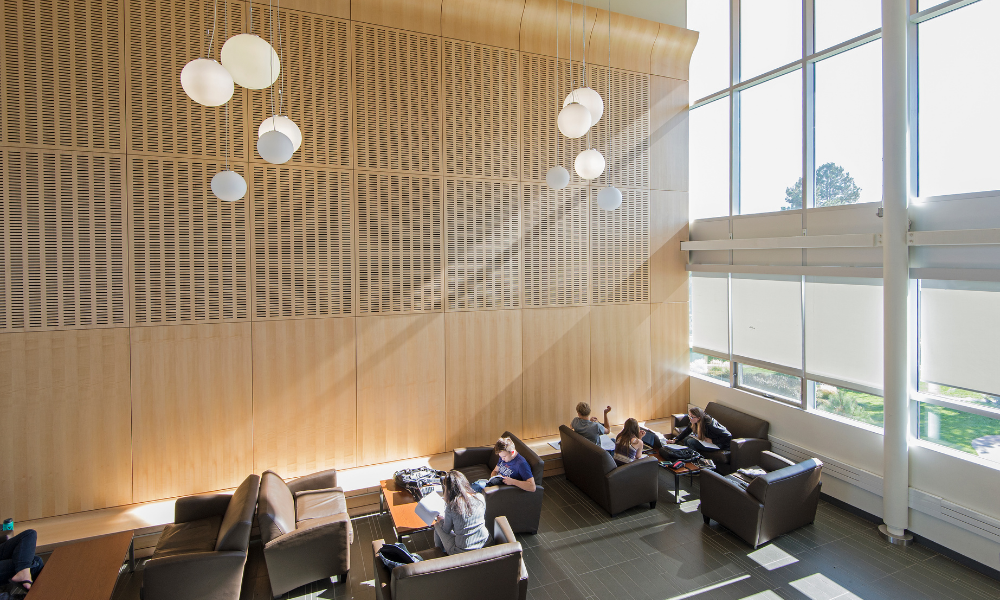
LOCATION:
Kamloops, British Columbia (licensure requirements)
LAW DEGREES AND ADMISSION REQUIREMENTS:
Juris Doctor (JD)
TUITION RATES:
The 2021-2022 tuition is $10,239.30, plus $627.86 in additional fees/semester for first year students, amounting to a full-year cost of $21,734.32, not including the cost of books or $248 for the health and dental plan. More information found here.
NOTABLE FACULTY MEMBERS:
OTHER INFORMATION:
JD students will have the opportunity to take classes exploring various fields of law, including entertainment law, media law, Indigenous law, animal law, construction law, sports law and video gaming law. A full list of the courses offered by the law school may be found here. Students may also have experiential learning opportunities such as participating in moot competitions, working at the Community Legal Clinic and volunteering for the university’s chapter of Pro Bono Students Canada. Eligible students may avail of, or may benefit from, financial aid in the form of awards, bursaries, entrance awards and prizes and external awards.
University of Toronto – Faculty of Law
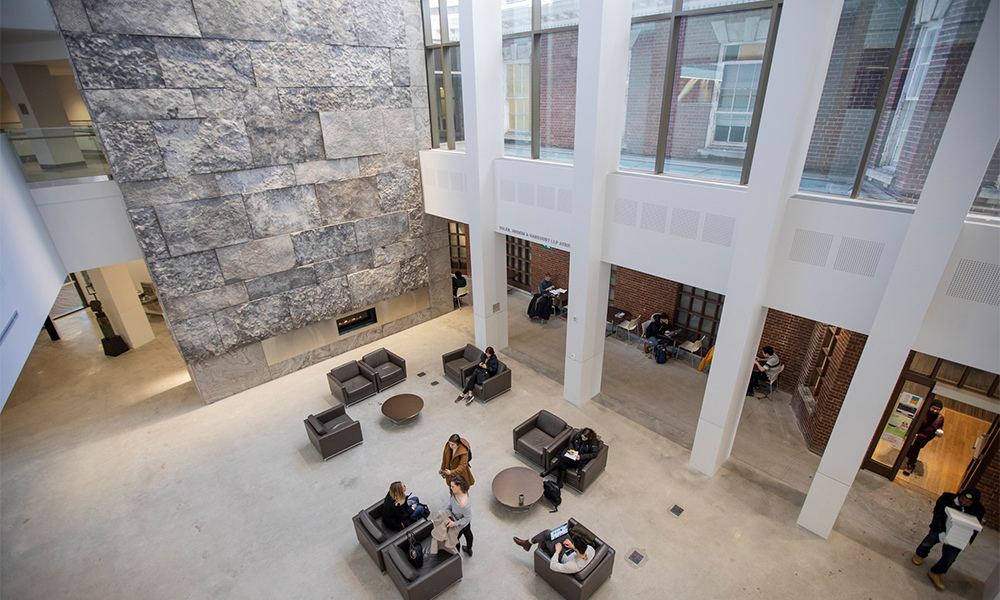
LOCATION:
Toronto, Ontario (licensure requirements)
LAW DEGREES AND ADMISSIONS REQUIREMENTS:
- Juris Doctor (JD)
- Master of Laws (LLM)
- Doctor of Juridical Science (SJD)
- Master of Studies in Law (MSL)
- Global Professional Master of Laws (GPLLM)
- Collaborative Specialization in Bioethics (CSB)
- Collaborative Specialization in Global Health (CSGH)
- Collaborative Program in Jewish Studies
- Collaborative Graduate Specialization In Sexual Diversity Studies
- Collaborative Program In Women and Gender Studies (CWGS)
- Juris Doctor and Master of Business Administration (JD/MBA)
- Juris Doctor and Master of Social Work (JD/MSW)
- Juris Doctor and Master of Public Policy (JD/MPP)
- Juris Doctor and Master of Global Affairs (JD/MGA)
- Juris Doctor and Master of Criminology (JD/MA)
- Juris Doctor and Master of Economics (JD/MA)
- Juris Doctor and Master in English (JD/MA)
- Juris Doctor and Master of European and Russian Affairs (JD/MA)
- Juris Doctor and Master of Information (JD/MI)
- Juris Doctor and Doctorate in Criminology and Sociolegal Studies (JD/PhD)
- Juris Doctor and Doctorate in Economics (JD/PhD)
- Juris Doctor and Doctorate in Political Science (JD/PhD)
- JD/Certificate in Aboriginal Legal Studies
- JD/Certificate in Environmental Studies
TUITION RATES:
The 2021-2022 tuition fees for Juris Doctor is $33,040 for domestic students and $57,040 for international students. Estimated additional ancillary and incidental fees are $1,675 to $1,725 for domestic students and $2,430 to $2,530 for international students. Here is the information for the graduate program:
Total tuition fees, excluding incidental fees, for domestic students:
- LLM: $9,280
- SJD: $6,210
- MSL: $9,280
- GPLLM: $33,570
Total tuition fees, excluding incidental fees, for international students:
- LLM: $44,470
- SJD: $6,210
- MSL: $30,080
- GPLLM: $68,100
NOTABLE FACULTY MEMBERS:
OTHER INFORMATION:
The law school’s Global Professional Master of Laws (GPLLM) is a one-year executive degree program exploring the constructs of law within the context of today’s increasingly regulated and global environment. Open to industry executives without a background in the law or a previous law degree, GPLLM students will gain analytical reasoning and knowledge about legal frameworks. Graduates emerge better equipped to identify and manage risk, to navigate the law’s complex interactions with business, technology and leadership and to create impactful solutions directly relevant to their leadership activities and career aspirations.
The law school is known for its scholarship, thought leadership, innovative research in law and economics and legal theory. Its students are hired by major employers in Canada, New York and London. Each year, approximately 95 per cent of its JD students secure articling jobs. This hire rate is the best in the country.
U of T Law values the diversity of its JD class. The school has made considerable efforts to recruit students from a wide range of backgrounds and perspectives from all over Canada. It offers a robust financial aid program, strictly based on financial need and not based on merit. The law school’s Post-Graduation Debt Relief Program is unique, as the first and one of the few financial aid programs that supports law graduates in low-paying careers for up to ten years after graduation.
University of Victoria – Faculty of Law
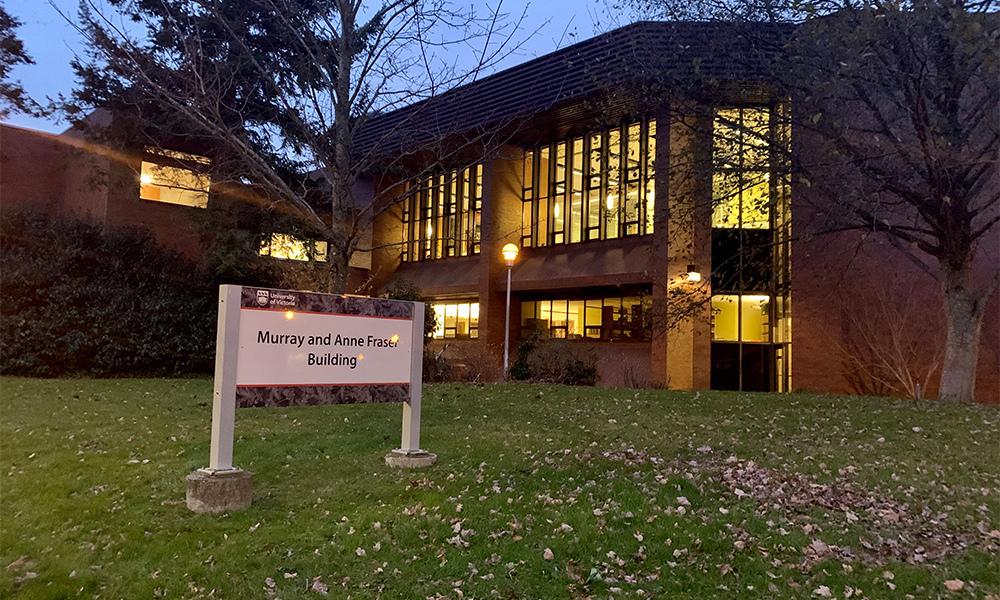
LOCATION:
Victoria, British Columbia (licensure requirements)
LAW DEGREES AND ADMISSION REQUIREMENTS:
- Juris Doctor (JD)
- Joint Indigenous Degree (JD/JID)
- Master of Laws (LLM)
- Doctor of Philosophy in Law (PhD)
TUITION RATES:
Juris Doctor (JD) and Joint Indigenous Degree (JD/JID):
- Domestic: The 2020-2021 tuition is $10,370, with fees of approximately $1,282. Texts and course materials are approximately $1,500/year, the Law Co-op work term fee is $746 and the cost of living off campus for a single student is approximately $13,552.
- International: $35,852
- Domestic: $5,916
- International: $7,461
NOTABLE FACULTY MEMBERS:
OTHER INFORMATION:
The law school’s Joint Indigenous Degree program is the first of its kind in the world. In the four-year JD/JID program, students graduate with two professional degrees and develop the skills to practice with Indigenous legal orders, within Canadian common law and at the interface between them. The school prides itself in offering some of the lowest tuition fees in Canada. It also offers multiple scholarships and bursaries. Between its JD and JID programs, on average, the law school met around 90–95 per cent of its students’ financial needs. The UVic Law Centre is the longest-running student law clinic in the country. Other legal clinics include the law school’s Environmental Law Clinic, Business Law Clinic and Indigenous Law Research Unit.
University of Western Ontario – Western Law
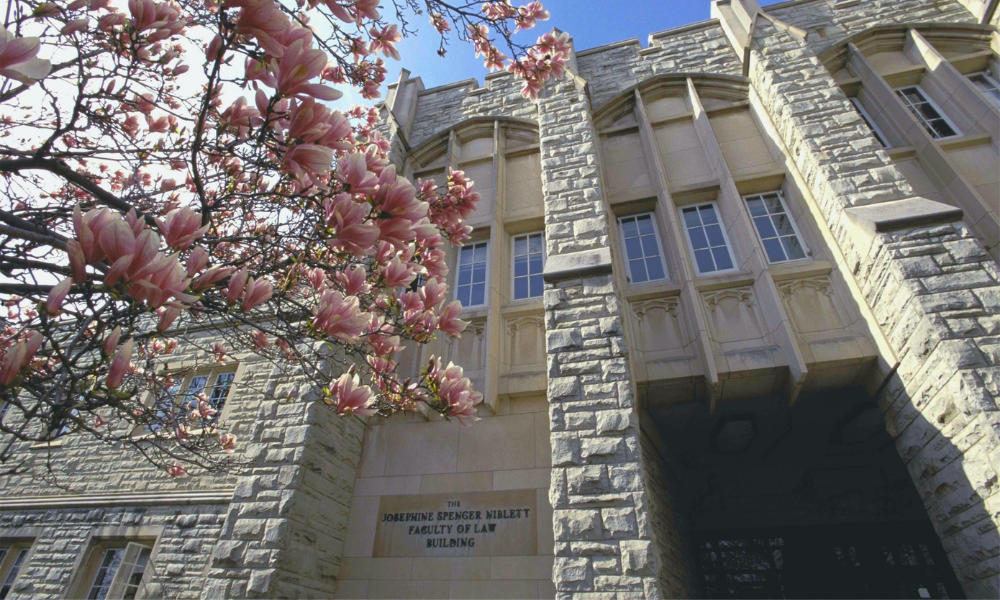
LOCATION:
London, Ontario (licensure requirements)
LAW DEGREES AND ADMISSION REQUIREMENTS:
- Juris Doctor (JD)
- Graduate Diploma in Mining Law, Finance, and Sustainability (GDip)
- Master of Laws (LLM)
- Master of Studies in Law (MSL)
- Doctor of Philosophy in Law (PhD)
Combined undergraduate programs
- Honours in Business Administration and Juris Doctor (HBA/JD)
- Bachelor of Engineering Science and Juris Doctor (BESc/JD)
- Juris Doctor and Master of Business Administration (JD/MBA)
- Juris Doctor and Master of Science (Geology or Geophysics) (JD/MSc)
- Juris Doctor and Master of Arts (History) (JD/MA)
Programs with exchange partners
- Western / Université Laval Joint Program
- Juris Doctor and Master of Laws (JD/LLM) in partnership with the University of Groningen in the Netherlands
TUITION RATES:
Juris Doctor (JD): Tuition and supplemental fees for 2020-2021 amounted to $21,765.
- LLM and MSL: Tuition and supplemental fees for 2020-2021 amounted to $12,046.
- PhD: Tuition and supplemental fees for 2020-2021 amounted to $8,038.
- GDip Mining Law: Tuition and supplemental fees for 2020-2021 amounted to $14,805.
NOTABLE FACULTY MEMBERS:
OTHER INFORMATION:
Western Law is committed to excellence and diversity. Accordingly, the admission policy allows applicants to show their potential in a variety of ways and seeks to produce a mix of students with diverse backgrounds. Recent information about the law school’s class profiles may be found here. The law school’s Small Group Program lets first-year students take a core course with a small group of 20 to 22 students where they are introduced to fundamental legal skills and provided with an invaluable support system.
Incoming first-year students may be eligible to receive Dean of Law Entrance Scholarships in amounts of up to $40,000. A full description of all Western Law entrance scholarships may be found here. In addition, Western Law financially supports the law school application process for five Black undergraduate students annually. Details are available on the Prospective Black Law Students webpage. Western Law also offers a free LSAT Preparation course annually for high-potential Black, Indigenous, and low-income students.
The law school offers a number of noteworthy programs, class options and experiential learning opportunities, including the following:
- Certification in Global Sustainability for JD candidates
- Specialization in Transitional Justice and Post-Conflict Reconstruction for students in graduate programs
- Courses in Mining Law
- International Summer Law Internship Program
- Extended-time program, where the JD program can be done part-time
- Sport Solution Clinic, the only sports law clinic offered by a law school in North America, as well as other legal clinics
- The Torys LLP Business and Law Pre-Eminent Scholars Series
- Internship opportunities
University of Windsor – Windsor Law

LOCATION:
Windsor, Ontario (licensure requirements)
ADMISSION REQUIREMENTS:
LAW DEGREES:
- Juris Doctor (JD)
- Canadian and American Dual Juris Doctor (JD)
- Juris Doctor and Master of Business Administration (JD/MBA)
- Juris Doctor and Master of Social Work (JD/MSW)
- Master of Laws (LLM)
TUITION RATES:
- JD – $9665.08/term for full-time students who are Canadian citizens or permanent residents
- LLM – $3322.36/term for full-time students who are Canadian citizens or permanent residents
- Canadian and American Dual JD
NOTABLE FACULTY MEMBERS:
OTHER INFORMATION:
One of the most diverse law schools in Canada, Windsor Law offers various experiential learning opportunities through its legal clinics and centres including the Class Action Clinic and the Indigenous Legal Orders Institute. Windsor Law sits on the traditional territory of the Three Fires Confederacy, which is composed of the Ojibway, the Odawa and the Potawatomi. The law school is committed to ensuring Indigenous legal traditions and perspectives are fully acknowledged and respected in its teaching, research and community engagement. More information about the law school’s programs, admissions process and student organizations may be found here.
York University – Osgoode Hall Law School
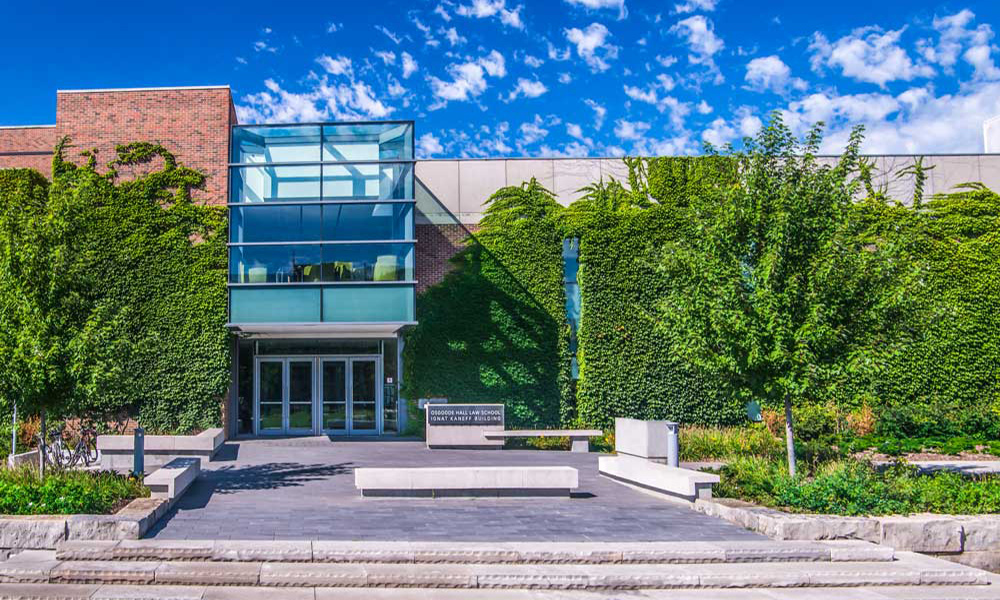
LOCATION:
Toronto, Ontario (licensure requirements)
LAW DEGREES AND ADMISSION REQUIREMENTS:
- Juris Doctor (JD)
- Master of Laws (LLM) – Research
- Master of Laws (LLM) – Professional
- Doctor of Philosophy in Law (PhD)
- JD/MBA with the Schulich School of Business at York
- JD/MES with the Faculty of Environment and Urban Change at York
- JD/MA in Philosophy with the Department of Philosophy at York
- JD/LLB (Civil) with the Faculté de droit - Université de Montréal
TUITION RATES:
- Domestic – $25,885.28/year, including ancillary fees
- International – $37,643.64/year, including ancillary fees
- Domestic full-time PhD and LLM: $1,711.39/term
- International full-time LLM: $6,550.88/term
- International full-time PhD: $6,275.88/term
Domestic:
- Part-time fee – $3,800.79/term
- Full-time fee – $7,601.58/term
International:
- Part-time fee – $7,264.03/term
- Full-time fee – $14,528.06 /term
These rates are for 2021-2022. Information found here.
NOTABLE FACULTY MEMBERS:
OTHER INFORMATION:
JD students may receive financial assistance through the bursary program or through the income contingent loan program as well as awards, scholarships and prizes. Some experiential learning opportunities include clinical programs, internship programs and the Anishinaabe Law Camp. Demographic information on the student body may be found here.
As for LLM and PhD students, eligible students may avail of the Osgoode Graduate Student Awards. Demographic information on students in the graduate program may be found here. The law school’s professional LLM program accepts professionals both with or without law degrees, provides 15 specializations, holds classes from two locations and offers distance learning options through simultaneous live webcasting.
The law school recently launched the Graduate Diploma in Foundations of Canadian Law, designed to provide a deep understanding of Canadian law in the key areas of public and private law. It is the only program of its kind in Canada.
— With files from Anita Balakrishnan










